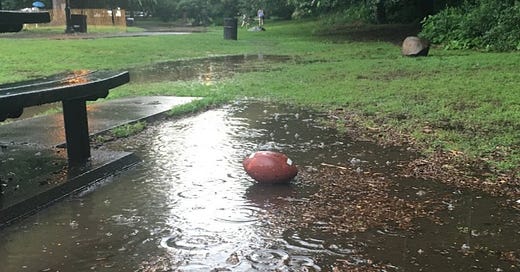The man is yelling at nobody
🌊 SURF THE TIDE OF FORTUNE: Using previous experiences of suffering to fuel future moments of compassion and gratitude
Imagine yourself in the following public transportation situation.
You feel irritated because the guy next to you on the subway is making a loud, obnoxious phone call, distracting everyone on the train.
But then you glance down notice that his phone isn’t even turned on.
The man is yelling at nobody.
How would you feel then?
This exact situation happened to me once, and it was a poignant moment of perspective that couldn’t be ignored.
It was a very human reminder that we can never truly know another person’s experience. And we can rarely explain why one person’s circumstances differs from ours. As such, we are wise to assume that everyone is fighting a battle that we know nothing about.
Because it’s all relative. That’s how human perception works. Our brains make comparisons.
Carr, the late great journalist and author, edited an inspiring book of perspectives on gratitude. One theory from the research is:
When interpret our better circumstances as evidence of worthiness and superiority, then our social comparison fosters feelings of entitlement rather than appreciation.
But if one empathizes with those in worse circumstances, recognizing their plight could have been ours, then comparison can foster humility for one’s circumstances, as well as promote helping those less fortunate.
Indeed, the tides of fortune really can turn very quickly. Ask anyone who’s ever been laid off by an employer, dumped by a lover, or accidentally sideswiped by a bakery truck going thirty miles an hour.
You don’t really know how it feels until it happens to you.
And make no mistake, it sucks in the moment. But the upside is, that experience fuels your compassion going forward, since you can’t unring the bell of suffering. The reverberations of any miserable experience are useful to you at a future moment when you encounter another person who has it worse.
In my experience, our blessings are only absent because we cannot recognize them. If we can’t find at least one thing for which we’re grateful, then we’re not looking hard enough.
Considering all the horrible things that haven’t happened to us yet, and considering the suffering that so many millions of people feel every single day, that would be incomprehensible to our brains, maybe this moment isn’t as insufferable as we originally thought.
Harris, a favorite modern philosopher of mine, recently shared a meditation on gratitude. He wrote:
Just think of what it would be like to lose everything, and then be restored to the moment you’re now in, however ordinary. To have spent this day free from some terrifying encounter with chaos is to be lucky. Just look around you, and take a moment to feel how lucky you are. You get another day to live on this earth. Enjoy it.
LET ME ASK YA THIS…
Is not a bare foot better than having no foot at all?



